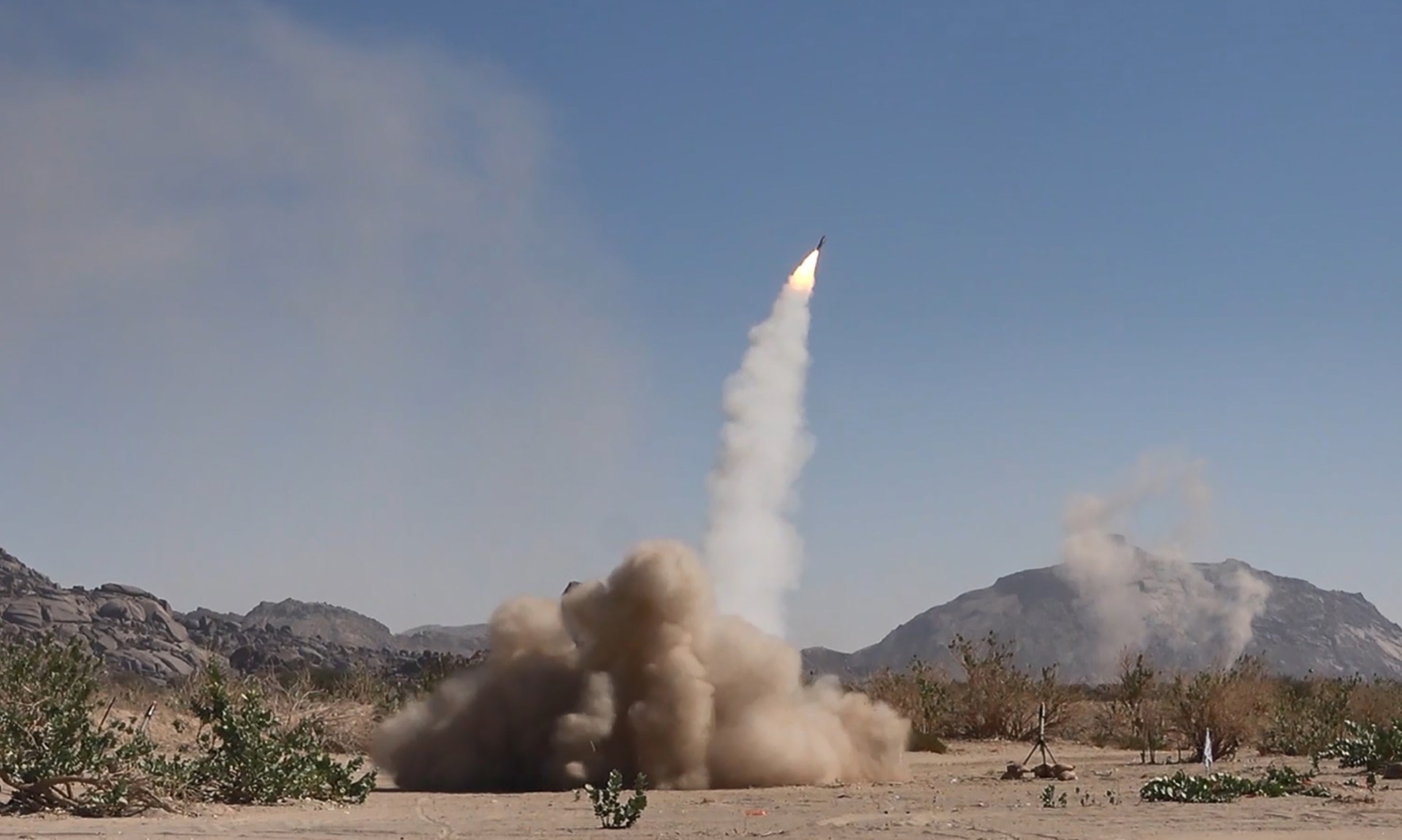The Houthis fire a missile during a previous military exercise (European)
Commander of the US Navy's Fifth Fleet, Major General George Wyckoff, confirmed that the Houthis have not yet been deterred by the US-led strike campaign aimed at destroying their capabilities, and they still continue to attack international commercial ships.
Wyckoff explained in an exclusive interview with Al-Monitor, a website issued from Washington and specialized in Middle East affairs, that diplomatic pressure could eventually push the Houthis to stop their bold attacks on international commercial shipping ships.
Writer Jared Zuba, who conducted the interview, noted that Wyckoff, who leads the US-led coalition naval forces in the framework of Operation “Prosperity Guardian” against the Houthis, was optimistic about the “victories” achieved by the destroyer crews and fighter pilots of the USS Eisenhower aircraft carrier group. ", which shot down dozens of Houthi drones and anti-ship missiles, representing a historical precedent in the era of marching warfare.
Wyckoff also stressed, when asked whether the US Army’s response was successful “at the tactical level,” that these efforts are effective and that he has never felt more proud during his 34 years of work in the US Navy than he feels today, and he has never seen such efforts made by the Navy. For the international coalition.
Wyckoff: Diplomatic pressure could push the Houthis to stop their bold attacks (US Naval Air Force website)
An acknowledgment that progress is still elusive
However, the writer says that Wyckoff stressed that the coalition attacks did not deter the Houthis, expressing his hope that their strikes would provide at least some space and time for decision-making, and allow diplomatic efforts and the international community to pressure the Houthis to stop their attacks on ships.
He added that Wyckoff acknowledged that signs of progress remain elusive, and it is difficult to say whether the coalition has slowed their ability to launch attacks or not.
The writer said that the Houthis have launched more than 60 attacks on civilian cargo ships and warships allied with the United States with precision-guided missiles and drones since last November, and described their attacks as a retaliatory response to the Israeli war in the Gaza Strip.
Unprecedented obstacles
He explained that defending international shipping is a traditional mission that has long been undertaken by the US Navy and its allies, but US military leaders face a set of unprecedented obstacles represented by the presence of a non-state actor armed with precision-guided missiles, which threatens a major choke point in the global economy.
US Navy commanders overseeing the strikes admit that they simply do not have good information about the size of the stockpile that the Houthis have accumulated over the past decade.
The intelligence gap has long hampered US-led efforts to intercept Houthi supply lines.
Wyckoff confirmed that Houthi fighters are adjusting their techniques, resorting to more movement, and trying to be more deceptive in their actions.
They have a large arsenal
American defense officials say that the Houthis maintain a large arsenal and appear prepared for escalation.
In early January, the Houthis sent an explosive boat marching towards commercial shipping lanes, just days after they directed their guns at two US Navy helicopters. This month, they attempted to deploy an undersea march that was pre-emptively destroyed by US strikes.
Wyckoff said there are many air, land, and sea areas where the Houthis could endanger the southern Red Sea.
America avoids targeting Houthi leaders
The writer pointed out that, as part of its determination to contain the spread of the Israeli war in Gaza and avoid a comprehensive regional conflict, the administration of US President Joe Biden has so far ignored calls by former senior US military officials to directly target the Houthi leadership.
Instead, the current naval campaign has focused on undermining the Houthis' weapons while disrupting their communications, intelligence gathering, and command and control capabilities.
Wyckoff said that from a strategic perspective, the international community has a lot to do, and this extends beyond the military dimension.
Drawing America back into the region
He pointed out that the US military confrontation in Yemen, Lebanon, Syria and Iraq resulting from the war between the Islamic Resistance Movement (Hamas) and Israel has attracted large US naval assets at a time when the US Department of Defense (the Pentagon) is seeking to reduce its long-term presence in the Middle East in anticipation of a confrontation with China in the coming months. The coming decades.
In an attempt to compensate for its declining presence in recent years, the Fifth Fleet has sought to enhance multinational maritime security cooperation, mainly through combined naval forces stationed out of Bahrain.
There is no answer on how long the naval operation will last
Wyckoff acknowledged that key details remain to be ironed out, such as whether the US-led Operation Prosperity Sentinel and the parallel EU Aspids operation, led by Greece, would divide up areas of waterways to patrol, or assign different countries' fleets to focus on protecting commercial ships. of its countries.
He said he was confident that in a short time, when European partners begin to flow into the region, international forces will be able to improve their influence.
Regarding how long the naval missions are expected to last, Wyckoff said that this really depends on how long the Houthis decide to continue their attacks in the sea lanes.
Source: Al-Monitor

